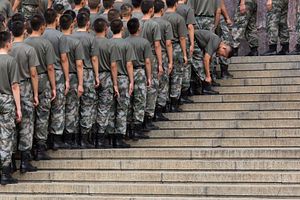China’s military, the People’s Liberation Army (PLA), is aiming to improve the quality of its recruits in the 2018 conscription season (from August 1 to September 30). While conscription still technically exists under China’s Military Service Law, it has been rarely enforced by the authorities because China’s vast population produces more than enough volunteers for its military needs.
On June 27, the annual National Conscription Work Video Conference was held. It set three priorities for this year’s conscription work. One priority is to increase recruits for the navy and the air force relative to the army. This is not surprising given that the PLA is currently in the process of rebalancing its force composition by downsizing its army and boosting its air, naval, and missile forces. To illustrate, since July last year, the PLA has cut around 300,000 troops, with the bulk coming from its ground forces.
Another priority is to ensure a higher caliber intake by imposing tougher education criteria. As a result, a lower number of high school students will be recruited. Instead, the focus will be on attracting current and recently graduated university students, and senior high school students.
The need for recruits with higher levels of education is not surprising or new. For years now, the PLA has attempted to increase the caliber of its recruits. A big driver of this is the increasing technological sophistication of China’s military, especially across maritime, air, missile, cyber, and space domains.
The final priority for this year is the piloting of “precision recruitment stations” across selected provincial military regions, and services and branches. While it is unclear what this would entail, presumably these pilot stations would leverage information and data technology to better match potential recruits to operational needs.
To sum up, the PLA’s 2018 recruitment priorities reflect the demands of its growing technological sophistication as well as its continuing effort to become a leaner fighting force with a better force composition.
Adam Ni is a Visiting Fellow at the Strategic and Defence Studies Centre, Australian National University. His areas of interest include China’s international relations, strategy and security issues. Over the last decade, he has worked in variety of China-related positions in academia, government and the private sector. Adam can be found on Twitter @adam_ni.

































